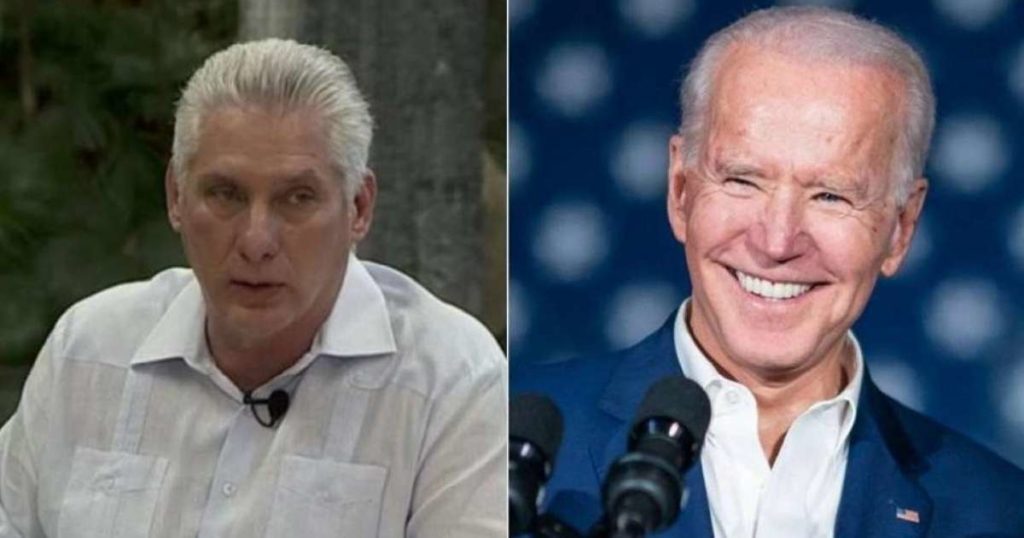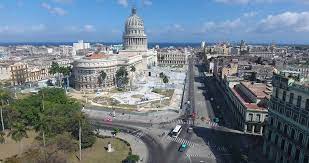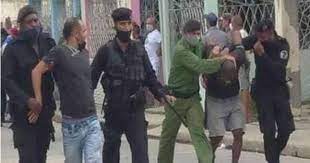ENCALLA LA LIBERACION DE LOS PRESOS POLITICOS CUBANOS POR DISCREPANCIAS PARTIDARIAS.
El actual presidente de Cuba Díaz-Canel ha hablado con todos los sectores, pero persisten las dudas y precauciones frente a Estados Unidos, que no son nuevas. Discrepancias en gobierno cubano encallan liberación de presos políticos y arreglo con Estados Unidos.
Discrepancias en el gobierno cubano han encallado la liberación de los presos políticos y una mejora de las relaciones con Estados Unidos, reconoció a CiberCuba una alta funcionaria de La Habana, que exigió el anonimato.
“Nos está pasando algo parecido a lo que le pasó al compañero Raúl (Castro) con el esfuerzo del presidente (Barack) Obama; cuando tuvo que admitir que no había consenso en la dirección revolucionaria sobre la normalización bilateral”, apuntó.
“El compañero (Miguel) Díaz-Canel ha hablado con todos los sectores, pero persisten las dudas y precauciones frente a Estados Unidos, que no son nuevas, vienen de la época del comandante en jefe y nosotros debemos actuar siempre, teniendo en cuenta el poder económico de la emigración y otros factores”, precisó sin querer identificar a los ámbitos discrepantes y si Raúl Castro ha sido consultado.
Son “compañeros de varios sectores y algunos muy reconocidos por prestigio y autoridad”, concluyó.
Los sectores discrepantes son “algunos militares; pese a las ventajas económicas que reportaría el arreglo con Estados Unidos a Gaesa, viceprimeros ministros y funcionarios del aparato del partido”, señaló un ex alto funcionario del Comité Central, al tanto de las negociaciones del presidente Díaz-Canel con los discrepantes.
Quizá a algunos compañeros se les paró el reloj, pero estamos en una situación peor que cuando negociamos con Obama y creo que el presidente lo entiende, pero “no consigue destrabar el tema”, concluyó.
Hasta el momento, Washington mantiene silencio sobre el retraso de Cuba, sin dejar de denunciar atropellos a los derechos humanos; pero una fuente próxima al Departamento de Estado apuntó que la “insinuación” de Biden a (Bob) Menéndez; tras el debate sobre el estado de la unión, podría indicar “cierto desconcierto ante el manejo de los tiempos” por La Habana.
Un ex miembro de la administración Obama relativizó el supuesto desencuentro bilateral porque “Cuba no pesa, no es nada”, recordó.
Fuentes de la oposición cubana atribuyen el retraso al deseo del gobierno de “desterrar a los presos políticos y sus familias”, como se negoció con la España de Jorge Luis Rodríguez Zapatero y Miguel Ángel Moratinos para acoger a los encarcelados de la Primavera Negra.
“El mundo ha cambiado y Europa está en guerra, pero La Habana parece que no se entera y pretende desterrar a los presos; como acaba de hacer la dictadura nicaragüense; pero son más de mil reos, más sus familias y no 220”, indicaron.
Las dilaciones del gobierno cubano han llegado a exasperar al siempre prudente Vaticano que, por boca del cardenal Beniamino Stella, reclamó la liberación de los presos políticos, rechazó los argumentos técnicos del ministro de Justicia y subrayó: “es importante que los jóvenes; que en un momento manifestaron su pensamiento de la forma que conocemos, puedan volver a sus casas”.
“A veces, fuera de Cuba, se leen erróneamente los pronunciamientos de funcionarios nuestros; si el ministro (de Justicia) dijo que no cabe la figura de la amnistía es porque lo mandaron; como pasa también con el compañero Bruno (Rodríguez, canciller)”, subrayó un ex viceministro de Relaciones Exteriores.
La “ralentización cubana ha provocado un retraso de más de un mes sobre el calendario previsto para la liberación de los presos políticos”, señaló un funcionario de la Unión Europea que ha seguido de cerca las negociaciones de norteamericanos, europeos y el Vaticano con La Habana.
“A veces, hemos llegado a pensar que se trata de un tacticismo para obtener más concesiones a cambio; pero esta vez los norteamericanos no parecen decididos a ir tan lejos como Obama”, matizó.
Colombia, Brasil, México y Noruega coinciden en la “conveniencia” de sacar a Cuba de la lista de estados patrocinadores del terrorismo, pero no entienden “la lentitud” con que se está conduciendo La Habana; aseguró.
El presidente López-Obrador está siendo “amistoso y comprensivo” con Cuba, pero en nuestro gobierno empieza a instalarse la sensación que el presidente Díaz-Canel no escucha todo lo que transmite el nuestro o no puede avanzar”, reveló una funcionaria de la Secretaría de Relaciones Exteriores de México.
THE RELEASE OF CUBAN POLITICAL PRISONERS STANDS AWAY DUE TO PARTY DISCREPANCIES.
Today Cuban President Díaz-Canel has spoken with all sectors, but doubts and precautions against the United States persist, which are not new. Discrepancies in the Cuban government-run around on the release of political prisoners and an agreement with the United States
Discrepancies in the Cuban government have stalled the release of political prisoners and an improvement in relations with the United States, a senior Havana official told CiberCuba, who demanded anonymity.
“Something similar to what happened to comrade Raúl (Castro) is happening to us with the effort of President (Barack) Obama; when he had to admit that there was no consensus in the revolutionary leadership on bilateral normalization,” she pointed out.
“Comrade (Miguel) Díaz-Canel has spoken with all sectors, but doubts and precautions against the United States persist, which are not new, they come from the time of the commander in chief and we must always act, taking into account the economic power of emigration and other factors,” he inadvertently specified the discrepant spheres and whether Raúl Castro has been consulted.
They are “colleagues from various sectors and some are highly recognized for their prestige and authority,” he concluded.
The dissenting sectors are “some of the militaries; despite the economic advantages that the arrangement with the United States would bring to Gaesa, deputy prime ministers and functionaries of the party apparatus,” said a former high-ranking official of the Central Committee, aware of President Díaz’s negotiations. -Canel with the dissenting.
Perhaps some of our comrades have stopped their watch, but we are in a worse situation than when we negotiated with Obama I think the president understands this, but “he can’t unlock the issue,” he concluded.
Until now, Washington has kept silent about Cuba’s delay, without ceasing to denounce violations of human rights; but a source close to the State Department pointed out that Biden’s “innuendo” to (Bob) Menéndez; after the debate on the state of the union, it could indicate “a certain bewilderment at the handling of the times” by Havana.
A former member of the Obama administration downplayed the supposed bilateral disagreement because “Cuba doesn’t matter, it’s nothing,” he recalled.
Cuban opposition sources attribute the delay to the government’s desire to “exile the political prisoners and their families”, as was negotiated with the Spain of Jorge Luis Rodríguez Zapatero and Miguel Ángel Moratinos to accommodate those imprisoned from the Black Spring.
“The world has changed and Europe is at war, but Havana seems not to find out and intends to banish the prisoners; as the Nicaraguan dictatorship has just done; but there are more than a thousand inmates, plus their families, and not 220,” they indicated.
The delays of the Cuban government have come to exasperate the always prudent Vatican which, through the mouth of Cardinal Beniamino Stella, demanded the release of political prisoners, rejected the technical arguments of the Minister of Justice, and stressed: “it is important that young people; that in a moment they expressed their thought in the way we know, they can return to their homes”.
“Sometimes, outside of Cuba, the statements of our officials are misread; if the minister (of Justice) said that the figure of amnesty does not fit, it is because they sent him; as also happens with comrade Bruno (Rodríguez, foreign minister) “, stressed a former deputy foreign minister.
The “Cuban slowdown has caused a delay of more than a month in the schedule for the release of political prisoners,” said an official from the European Union who has closely followed the negotiations between the United States, Europe, and the Vatican with Havana.
“Sometimes, we have come to think that it is a tactic to obtain more concessions in return, but this time the North Americans do not seem determined to go as far as Obama”, he qualified.
Colombia, Brazil, Mexico, and Norway agree on the “advisability” of removing Cuba from the list of state sponsors of terrorism, but they do not understand the “slowness” with which Havana is being conducted; he assured.
President López-Obrador is being “friendly and understanding” with Cuba, but in our government, the feeling is beginning to set in that President Díaz-Canel does not listen to everything that ours transmits or cannot move forward,” revealed an official from the Secretariat of Foreign Relations of Mexico.
Agencies/ CiberCuba/ Carlos Cabrera /Extractos/ Excerpts/ Internet Photos/ Arnoldo Varona/ www.TheCubanHistory.com
THE CUBAN HISTORY, HOLLYWOOD.



 ENCALLA la Liberación de los Presos Políticos Cubanos por Discrepancias Partidarias. * THE RELEASE of Cuban Political Prisoners Stands Away due to Party Discrepancies. PHOTOS.
ENCALLA la Liberación de los Presos Políticos Cubanos por Discrepancias Partidarias. * THE RELEASE of Cuban Political Prisoners Stands Away due to Party Discrepancies. PHOTOS.





